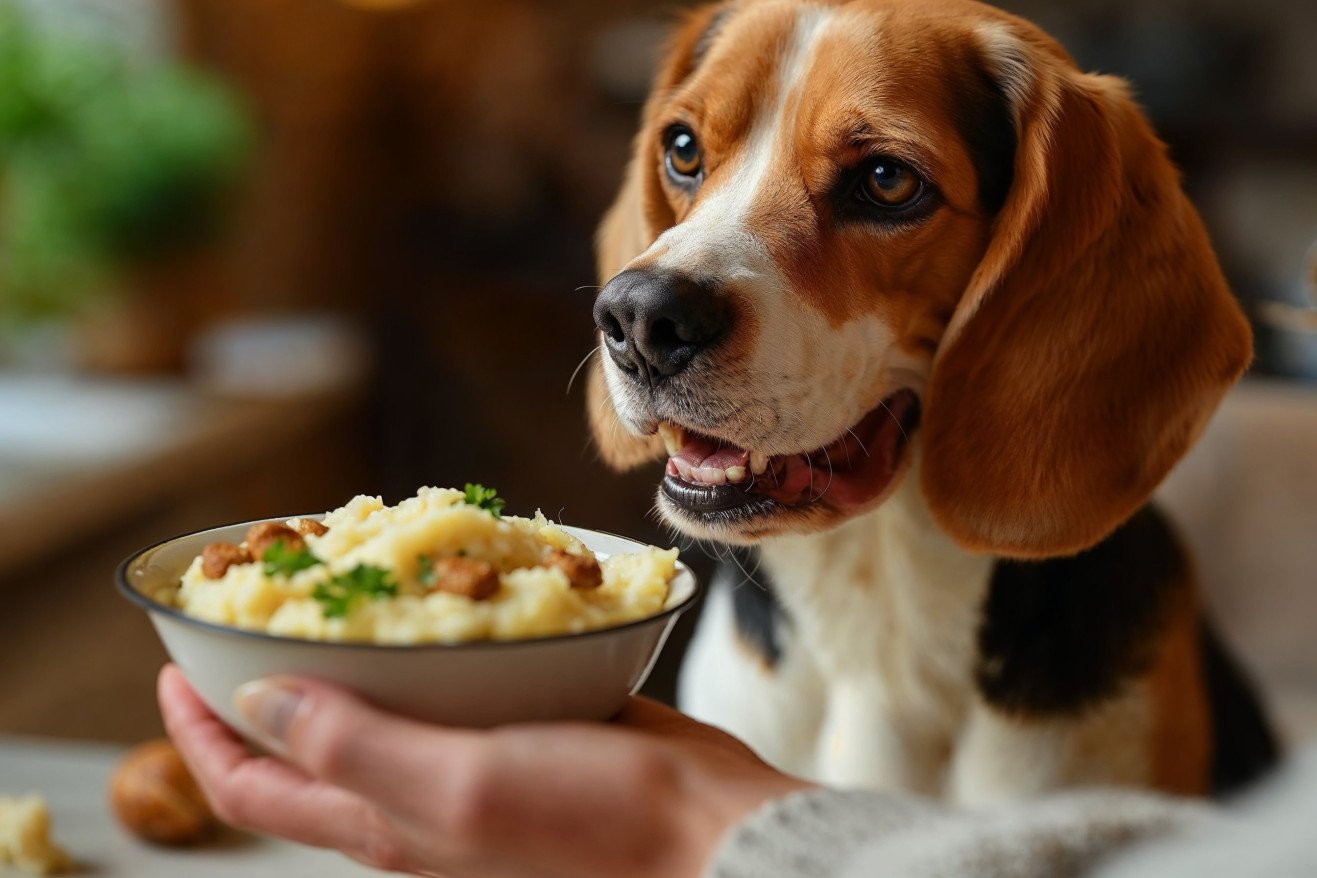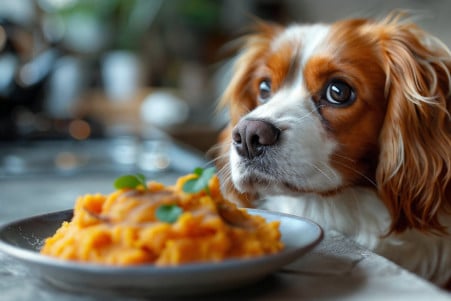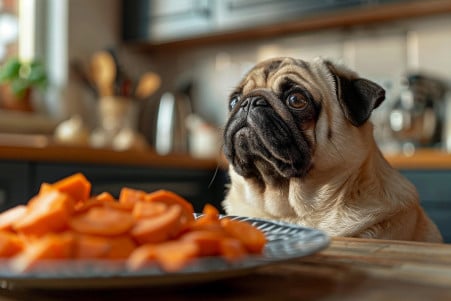Can Dogs Eat Potatoes? Safe Ways to Share Spuds
26 January 2024 • Updated 28 January 2024

Potatoes are a dietary staple for many people, but whether or not they are good for dogs is a bit more complicated. Dogs can eat cooked potatoes that are plain and free of butter, salt, and other seasonings. However, the presence of solanine in raw potatoes and potato skins can be toxic. It’s also important to feed potatoes in moderation because they are high in carbohydrates and can contribute to obesity.
This article takes a deep dive into a range of nutritional research and veterinary nutritional recommendations to help you understand the ins and outs of feeding potatoes to dogs. It looks at studies by animal nutritionists and scientific research to find out how different types of potatoes and cooking methods impact dogs.
The aim is to give you a well-rounded view that will help you decide if and how to feed potatoes to your dog in a way that is safe and healthy.
Can dogs eat potatoes?
How to Use Potatoes in Your Dog’s Diet
Potatoes offer a range of nutrients that can be helpful in certain dietary situations. Pet Nutrition at OVC explains that potatoes are a great source of carbohydrates, with up to 90% of their dry weight consisting of this macronutrient, which makes them a good option for grain-free diets. They also offer important vitamins and minerals, like vitamin C and potassium, that are important for immune health and cellular function.
That said, the high carbohydrate content of potatoes is a two-edged sword. As Dogs and Cats Magazine explains, while dogs can metabolize carbohydrates for energy, they aren’t a required part of their diet.
In fact, too many carbs can lead to obesity and even diabetes in dogs that are genetically predisposed to the condition. As a result, pet parents should be careful about including potatoes in their dog’s diet, especially if their dog is sedentary or has other health issues.
The debate over grain-free pet food has brought potatoes to the forefront as an alternative source of carbohydrates.
However, Solid Gold Pets explains that there are concerns about the glycemic index of potatoes and their impact on blood sugar levels, which has led some pet parents to look for formulas that don’t include potatoes.
This shows that while potatoes can offer important nutrients, they should be used as an occasional addition to a dog’s diet, which should be rich in protein and other important nutrients. This assessment lays the groundwork for understanding how to safely prepare and use potatoes in your dog’s diet.
How to Cook Potatoes for Your Dog: The Right Way to Do It
The way you cook potatoes for your dog can have a big impact on their safety and nutritional value. A study in PubMed shows that common cooking methods like boiling, baking, and microwaving all change the physical and nutritional properties of potatoes.
For dogs, boiling and baking are the best options because they remove solanine, a toxic substance found in raw potatoes and potato skins. On the other hand, frying is the worst option because it can add unhealthy fats and reduce the nutritional value of the potatoes.
A study in Foods shows that cooking potatoes can reduce their phytochemical and antioxidant content, but steaming and microwaving may be better than other cooking methods at preserving these nutrients. Steaming, in particular, is a good option for cooking potatoes for dogs because it doesn’t require you to add fats or oils.
It’s important to make sure that you cook potatoes for your dog thoroughly and remove the skins to make sure that there’s no risk of solanine poisoning. You should also make sure that you only feed your dog cooked potatoes as an occasional treat, not as a regular part of their diet, and that you feed them in moderation to make sure that you don’t compromise your dog’s health.
For specific recipes and portion sizes, it’s best to talk to a vet so that you can make sure that you’re meeting your dog’s individual nutritional needs.
How to Tell If Your Dog Has a Potato Allergy
There are a few different symptoms that could indicate a potato allergy in dogs, including skin issues, ear infections, and digestive problems. However, while potatoes are a common allergen, Daily Puppy explains that they are just one of many potential allergens, including beef, dairy, and wheat.
TuftsYourDog also explains that it’s important to make sure that a dog’s symptoms are actually caused by a food allergy and not another issue, like atopy or food intolerance.
Veterinarians can diagnose a potato allergy with an elimination diet, which involves removing potatoes from a dog’s diet for a period of time, usually 60 to 90 days, and then reintroducing them to see how the dog’s body reacts. This can help pet parents narrow down the specific allergen, but Nom Nom explains that it’s important to make sure that the dog is on a controlled diet to avoid a misdiagnosis.
If you think your dog has a potato allergy, it’s important to talk to a vet. They can help you with an elimination diet and other treatments. By treating food allergies early, you can help prevent other issues and make sure that your dog is healthy and happy with a diet that’s tailored to their specific needs.
Special Dietary Needs: How Potatoes Can Impact Dogs With Health Issues
While potatoes can be part of a healthy diet for dogs, they should be introduced with caution to dogs with certain health issues, such as diabetes and obesity. Potatoes have a high glycemic index, which can lead to blood sugar spikes, so they are not recommended for diabetic dogs. This is especially worrisome because even cooked, unseasoned potatoes can be problematic, so it’s important to make sure that they are fed in moderation.
To make sure that potatoes can be included in the diet of a dog with specific health issues, it’s important for dog owners to know their dog’s specific needs.
For example, while some therapeutic diets may use the carbohydrates in potatoes, it’s important to make sure that they are being used in a way that won’t make the health issue worse.
It’s also been noted that there is a correlation between potatoes in commercial dog foods and heart disease, so it’s important to make sure that all treats, including those that contain potatoes, make up no more than 10% of a dog’s daily calories.
In general, especially for dogs with health issues, it’s important for pet owners to talk to their vet before making any changes to their dog’s diet. This will help ensure that potatoes can be included in a way that is safe and healthy, while also making sure that they are meeting the dog’s specific dietary needs.
The Takeaway: Potatoes in Your Dog’s Bowl
Potatoes can be a healthy addition to your dog’s diet if they are prepared and served properly. As we’ve discussed, cooked potatoes without butter and other additives are safe and can offer important vitamins and minerals. Wellness Natural Pet Food notes that it’s important to cook potatoes well to make them easier to digest and recommends leaving the skin on for the fiber and minerals it contains.
That said, it’s important to use potatoes in moderation. The AKC warns that potatoes should be a small part of your dog’s diet to avoid issues like weight gain and diabetes, which can be caused by a diet high in carbohydrates. Pay attention to your dog’s individual needs and any potential sensitivities, and make sure to watch for any adverse reactions when you introduce new foods.
Always talk to your vet before adding potatoes or making other major dietary changes, especially if your dog has a health condition or is on a prescription diet. In short, potatoes can be a good source of energy and nutrients for your dog, but it’s important to use them responsibly to make sure your dog can enjoy them without any negative effects on their health.


